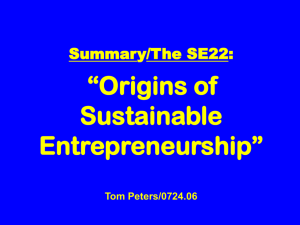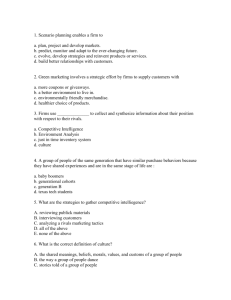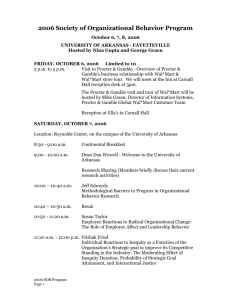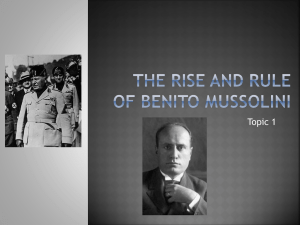Issue Y2K The Great War for Talent!
advertisement
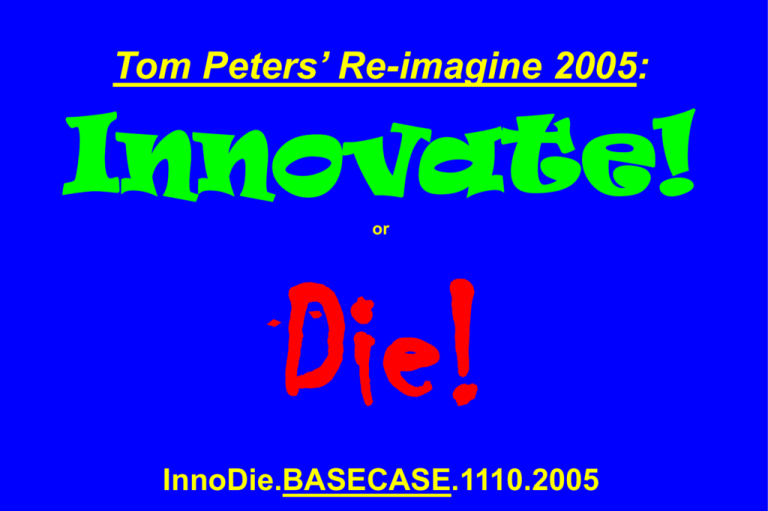
Tom Peters’ Re-imagine 2005: Innovate! or Die! InnoDie.BASECASE.1110.2005 I. Altered Context II. Innovation Imperative III. Leadership I. Altered Context II. Innovation Imperative III. Leadership Re-set the gauges to zero! m h THREE BILLION NEW CAPITALISTS —Clyde Prestowitz 600,000 350,000 70,000 “One Singaporean worker costs as much as … 3 … in Malaysia 8 … in Thailand 13 … in China 18 … in India.” Source: The Straits Times/08.18.03 “Thaksinomics” (after Thaksin Shinawatra, PM)/ “Bangkok Fashion City”: “managed asset reflation” (add to brand value of Thai textiles by demonstrating flair and design excellence) Source: The Straits Times/03.04.2004 Better By Design: A National Strategy NZ = Design Excellence Singapore Ireland New Zealand Australia The United States of America The United Arab Emirates Chile India Malaysia Thailand Taiwan Korea The Philippines Germany Italy Portugal Period “If you don’t like change, you’re going to like irrelevance even less.” —General Eric Shinseki, Chief of Staff. U. S. Army “It is not the strongest of the species that survives, nor the most intelligent, but the one most responsive to change.” —Charles Darwin Everything You Need to Know about “Strategy”: Tom’s Baker’s Dozen Axioms 1. Do you have awesome Talent … everywhere? Do you push that Talent to pursue Audacious Quests? 2. Is your Talent Pool loaded with wonderfully peculiar people who others would call “problems”? And what about your Extended Community of customers, vendors et al? 3. Is your Board of Directors as cool as your product offerings … and does it have 50 percent (or at least one-third) Women Members? 4. Long-term, it’s a “Top-line World”: Is creating a “culture” that cherishes above all things Innovation and Entrepreneurship your primary aim? Remember: Innovation … not Imitation! 5. Are the Ultimate Rewards heaped upon those who exhibit an unswerving “Bias for Action,” to quote the coauthors of In Search of Excellence? 6. Do you routinely use hot, aspirational words-terms like “Excellence” and B.H.A.G. (Big Hairy Audacious Goal, per Jim Collins) and “Let’s make a dent in the Universe” (the Word according to Steve Jobs)? Is “Reward excellent failures, punish mediocre successes” your de facto or de jure motto? 7. Do you subscribe to Jerry Garcia’s dictum: “We do not merely want to be the best of the best, we want to be the only ones who do what we do”? 8. Do you elaborate on and enhance Jerry G’s dictum by adding, “We subscribe to ‘Best Sourcing’—and only want to associate with the ‘best of the best’.” 9. Do you embrace the new technologies with child-like enthusiasm and a revolutionary’s zeal? 10. Do you “serve” and “satisfy” customers … or “go berserk” attempting to provide every customer with an “awesome experience” that does nothing less than transform the way she or he sees the world? 11. Do you understand … to your very marrow … that the two biggest under-served markets are Women and Boomers-Geezers? And that to “take advantage” of these two Monster “Trends” (FACTS OF LIFE) requires fundamental re-alignment of the enterprise? 12. Are your leaders accessible? Do they wear their passion on their sleeves? Does integrity ooze out of every pore of the enterprise? Is “We care” your implicit motto? 13. Do you understand business mantra #1 of the ’00s: DON’T TRY TO COMPETE WITH WAL*MART ON PRICE OR CHINA ON COST? (And if you get this last idea, then see the 12 above!) 13. Do you understand Business Mantra #1 of DON’T TRY TO COMPETE WITH WAL*MART ON PRICE OR CHINA ON COST? the ’00s: Innovate or “Forbes100” from 1917 to 1987: 39 members of the Class of ’17 were alive in ’87; 18 in ’87 F100; 18 F100 “survivors” underperformed the market by 20%; just 2 (2%), GE & Kodak, outperformed the market 1917 to 1987. S&P 500 from 1957 to 1997: 74 members of the Class of ’57 were alive in ’97; 12 (2.4%) of 500 outperformed the market from 1957 to 1997. Source: Dick Foster & Sarah Kaplan, Creative Destruction: Why Companies That Are Built to Last Underperform the Market Never “Home Free” … Sears, Macy’s — Wal*Mart, Target, CostCo BankAmerica, Citigroup — Fidelity, Commerce Bank, Carlyle Group, Lending Tree, PayPal IBM — Microsoft, Google, Infosys, Samsung US Steel, Bethlehem — Nucor ???? — McDonald’s, Starbucks GM, Ford — Honda, Hyundai, Tata AT&T/Western Electric — Avaya, Cisco ???? — Sony, Nintendo, Nokia “I am often asked by would-be entrepreneurs seeking escape from life within huge corporate structures, ‘How do I build a small firm for myself?’ The Buy a very large one and just wait.” answer seems obvious: —Paul Ormerod, Why Most Things Fail: Evolution, Extinction and Economics I. Altered Context II. Innovation Imperative III. Leadership Innovate or Brilliant! “A focus on cost-cutting and efficiency has helped many organizations weather the downturn, but this approach will ultimately Only the constant pursuit of innovation can ensure long-term success.” —Daniel render them obsolete. Muzyka, Dean, Sauder School of Business, Univ of British Columbia (FT/09.17.04) “Under his former boss, Jack Welch, the skills GE prized above all others were cost-cutting, efficiency and deal-making. What mattered was the continual improvement of operations, and that mindset helped the $152 billion industrial and finance behemoth become a marvel of earnings consistency. Immelt But in his GE, the new imperatives are risk-taking, sophisticated marketing and, above all, innovation.” —BW/032805 hasn’t turned his back on the old ways. “Consolidate or else! This is it!” * *Macy’s, Kmart, Xerox, IBM, Microsoft, TimeWarnerAOL … “Not a single company that qualified as having made a sustained transformation ignited its leap with a big acquisition or merger. Moreover, comparison companies—those that failed to make a leap or, if they did, failed to sustain it—often tried to make themselves great with a big acquisition or merger. They failed to grasp the simple truth that while you can buy your way to growth, you cannot buy your way to greatness.” —Jim Collins/Time/11.29.04 “When asked to name just one big merger that had lived up to expectations, Leon Cooperman, former cochairman of Goldman Sachs’ Investment Policy I’m sure there are success stories out there, but at this moment I draw a blank.” Committee, answered: —Mark Sirower, The Synergy Trap “Almost every personal friend I have in the world works on Wall Street. You can buy and sell the same company six times and everybody but I’m not sure we’re actually innovating. … Our challenge is to makes money, take nanotechnology into the future, to do personalized medicine …” —Jeff Immelt/Fast Company/07.05 Sanford Weill, Citigroup’s Former Leader, Frustrated As Empire Is Dismantled” —Headline/NYT/07.21.05 “Shremp is one of the last dinosaurs of Germany Inc. He represents a strategy of acquiring assets and building empires that just didn’t work.” —Arndt Ellinghorst/analyst/ Dresdner Kleinwort Wasserstein “Mr Lampert should stick to investing, not matchmaking.” —Gretchen Morgenson, Page 1, New York Times Sunday Business, 1106.05, “The Sears Catalog of Problems” (TP: So why does this S***/the Same S*** keep happening?) There’s “A” and then there’s “A.” 1103.2005/Headline/USA Today: “Time Warner Announces 80% Higher Earnings: Company Raises Stock Buyback Goal” TP: When a so-so company’s stock is in the tank and shareholders are restless and unimpressed with short-term earnings boosts and when the company has excess cash on hand and when the company has utterly no idea how to invest the excess cash in anything exciting that will offer a great return that will lift the share price it can buy back a big hunk of its stock which not only leads to a probable increase in share price but also relieves the company of the crushing burden of having to worry about doing anything imaginative with the money and it also puts new wealth in the hands of shareholders who following the precepts of portfolio theory can quit worrying for awhile about the hapless, unimaginative leadership of the buyback company and instead invest their newfound wealth in a firm such as Google or Amgen which always is in need of cash to fund a long list of very cool ideas which probably will result in the creation of … can you believe it … actual underlying and perhaps even sustainable value. “I don’t believe in economies You don’t get better by being bigger. You get worse.” of scale. —Dick Kovacevich/Wells Fargo/Forbes08.04 (ROA: Wells, 1.7%; Citi, 1.5%; BofA, 1.3%; J.P. Morgan Chase, 0.9%) Scale? “Microsoft’s Struggle With Scale” —Headline, FT, 09.2005 “Troubling Exits at Microsoft” —Cover Story, BW, 09.2005 “Too Big to Move Fast?” —Headline, BW, 09.2005 Spinoffs perform better than IPOs … track record, profits … “freed from the confines of the parent … more entrepreneurial, more nimble” —Jerry Knight/Washington Post/08.05 Market Share, Anyone? 240 industries: Market-share leader is ROA leader the time 29% of Source: Donald V. Potter, Wall Street Journal Market Share, Anyone? — 240 industries; market-share leader is ROA leader 29% of the time — Profit / ROA leaders: “aggressively weed out customers who generate low returns” Source: Donald V. Potter, Wall Street Journal “Good management was the most powerful reason [leading firms] failed to stay atop their industries. Precisely because these firms listened to their customers, invested aggressively in technologies that would provide their customers more and better products of the sort they wanted, and because they carefully studied market trends and systematically allocated investment capital to innovations that promised the best returns, they lost their positions of leadership.” Clayton Christensen, The Innovator’s Dilemma Focus! “All Strategy Is Local: True Scale’s Limitations: competitive advantages are harder to find and maintain than people realize. The odds are best in tightly drawn markets, not big, sprawling ones” —Title/Bruce Greenwald & Judd Kahn/HBR09.05 Different!* *“Dramatic Difference” (DH), “Remarkable Point of view” (SG) “The ‘surplus society’ has a surplus of similar companies, employing similar people, with similar educational backgrounds, coming up with similar ideas, producing similar things, with similar prices and similar quality.” Kjell Nordström and Jonas Ridderstråle, Funky Business Just Say “No” to … Imitation! “Value innovation is about making the competition irrelevant by creating uncontested market space. We argue that beating the competition within the confines of the existing industry is not the way to create profitable growth.” —Chan Kim & Renée Mauborgne (INSEAD), from Blue Ocean Strategy (The Times/London) “drive growth at a company famous for its discipline and productivity, but rarely thought of as a hive of creativity” —Point (Advertising Age)/09.05 “These days both Intel and Microsoft are scrambling to pay the piper for years of design entropy” —WSJ/08.05 “Acquisitions are about buying market share. Our challenge is to create markets. There is a big difference.” Peter Job, CEO, Reuters “[Immelt] is now identifying technologies with GE will systematically set out to build entirely new industries” —Strategy+Business, Fall 2005 “To grow, companies need to break out of a vicious cycle of competitive benchmarking and imitation.” —W. Chan Kim & Renée Mauborgne, “Think for Yourself —Stop Copying a Rival,” Financial Times/08.11.03 “The short road to ruin is to emulate the methods of your adversary.” — Winston Churchill “This is an essay about what it takes to create and sell something remarkable. It is a plea for originality, passion, guts and daring. You can’t be remarkable by following someone else who’s remarkable. One way to figure out a theory is to look at what’s working in the real world and determine what the successes have in common. But what could the Four Seasons and Motel 6 possibly have in common? Or NeimanMarcus and Wal*Mart? Or Nokia (bringing out new hardware every 30 days or so) and Nintendo (marketing the same Game Boy 14 years in a row)? It’s like trying to drive The thing that all these companies have in common is that they have nothing in common. They are looking in the rearview mirror. outliers. They’re on the fringes. Superfast or superslow. Very exclusive or very cheap. Extremely big or extremely small. The reason it’s so hard to follow the leader is this: The leader is the leader precisely because he did something remarkable. And that remarkable thing is now taken—so it’s no longer remarkable when you decide to do it.” —Seth Godin, Fast Company/02.2003 GH/TP: “Get better” vs “Get different” This is not a “mature category.” This is an “undistinguished category.” “When we did it ‘right’ it was still pretty ordinary.” Barry Gibbons on “Nightmare No. 1” Choose! Duet … Whirlpool … “washing machine” to “fabric care system” … white goods: “a sea of undifferentiated boxes” … $400 to $1,300 … “the Ferrari of washing machines” … consumer: “They are our little mechanical buddies. They have personality. When they are running efficiently, our lives are running efficiently. They are part of my family.” … “machine as aesthetic showpiece” … “laundry room” to “family studio” / “designer laundry room” (complements Sub-Zero refrigerator and home-theater center) Source: New York Times Magazine/01.11.2004 1997-2001 >$600: 10% to 18% $400-$600: 49% to 32% <$400: 41% to 50% Source: Trading Up, Michael Silverstein & Neil Fiske “The ‘mass market’ is dead. Consumers look for either price or The middle is untenable.” quality. —Walter Robb/COO/Whole Foods/Investors Business Daily/06.20.05 “Clients want either the best or the least expensive; there is no in between.” —from John Di Julius, Secret Service “Cheap” vs “Cool”: The Options Cheap: Nowhere to go except “more cheap”! Problem: the inevitable “next Dell”/“next /Wal*Mart” arrives with new biz model; meanwhile you drift toward more complexity/ sluggishness, especially if undertake sizeable mergers. Cool: From “Cool” (with resonable costs) to “Stay Cool”/“Better” vs “Different.” Continue/ Accelerate charge Up the VA Ladder. Tactics: (1) “Up the experience ladder,” (2) Gamechanger Innovation. If not: “Cool” drifts/staggers toward untenable “Middle.” Easy! FLASH: Innovation is easy ! Innovation’s Saviors-in-Waiting Disgruntled Customers Off-the-Scope Competitors Rogue Employees Fringe Suppliers Wayne Burkan, Wide Angle Vision: Beat the Competition by Focusing on Fringe Competitors, Lost Customers, and Rogue Employees CUSTOMERS: “Futuredefining customers may account for only 2% to 3% of your total, but they represent a crucial window on the future.” Adrian Slywotzky, Mercer Consultants “If you worship at the throne of the voice of the customer, you’ll get only incremental advances.” Joseph Morone, President, Bentley College COMPETITORS: “The best swordsman in the world doesn’t need to fear the second best swordsman in the world; no, the person for him to be afraid of is some ignorant antagonist who has never had a sword in his hand before; he doesn’t do the thing he ought to do, and so the expert isn’t prepared for him; he does the thing he ought not to do and often it catches the expert out and ends him on the spot.” Mark Twain “How do dominant companies lose their position? Two-thirds of the time, they pick the wrong competitor to worry about.” —Don Listwin, CEO, Openwave Systems/WSJ/06.01.2004 (commenting on Nokia) Kodak …. Fuji GM …. Ford Ford …. GM IBM …. Siemens, Fujitsu Sears … Kmart Xerox …. Kodak, IBM “Don’t benchmark, futuremark!” Impetus: “The future is already here; it’s just not evenly distributed”—William Gibson Employees: “Are there enough weird people in the lab these days?” V. Chmn., pharmaceutical house, to a lab director We become who we hang out with! Measure “Strangeness”/Portfolio Quality Staff Consultants Vendors Out-sourcing Partners (#, Quality) Innovation Alliance Partners Customers Competitors (who we “benchmark” against) Strategic Initiatives Product Portfolio (LineEx v. Leap) IS/IT Projects HQ Location Lunch Mates Language Board “The Bottleneck is at the Top of the Bottle” “Where are you likely to find people with the least diversity of experience, the largest investment in the past, and the greatest reverence for industry dogma? At the top!” — Gary Hamel/“Strategy or Revolution”/Harvard Business Review Bold! No Wiggle Room! “Incrementalism is innovation’s worst enemy.” Nicholas Negroponte Just Say No … “I don’t intend to be known as the ‘King of the Tinkerers.’ ” CEO, large financial services company “Beware of the tyranny of making Small Changes to Small Things. Rather, make Big Changes to Things.” Big —Roger Enrico, former Chairman, PepsiCo “Wealth in this new regime flows directly from innovation, not optimization. That is, wealth is not gained by perfecting the known, but by imperfectly seizing the unknown.” —Kevin Kelly, New Rules for the New Economy “Reward excellent failures. Punish mediocre successes.” Phil Daniels, Sydney exec We all live in Dell-Wal*MarteBay-Google World! FedEx Economy” “the —headline/New York Times/10.08.05 Power Tools for Power Solutions/ Strategies! —TP 5% F500 have CIO on Board: “While some of the world’s most admired companies—Tesco, Wal*Mart —are transforming the business landscape by including technology experts on their boards, the vast majority are missing out on ways to boost productivity, competitiveness and shareholder value.” Source: Burson-Marsteller Fast! “It is not the strongest of the species that survives, nor the most intelligent, but the one most responsive to change.” —Charles Darwin Read It Closely: “We don’t sell We sell speed.” insurance anymore. Peter Lewis, Progressive “Strategy meetings held once or twice a year” to “Strategy meetings needed several times a week” Source: New York Times on Meg Whitman/eBay He who has the quickest O.O.D.A. Loops* wins! *Observe. Orient. Decide. Act. / Col. John Boyd “The most successful people are those who are good at plan B.” —James Yorke, mathematician, on chaos theory in The New Scientist Furious! [ “Bias for action” ] “too much talk, too little do” TP/BW on BigCo sin #1: “Ninety percent of what we call ‘management’ consists of making it difficult for people to get things done.” – Peter Drucker “Execution is the job of the business leader.” —Larry Bossidy & Ram Charan/ Execution: The Discipline of Getting Things Done “We have a ‘strategic’ plan. It’s called doing things.” — Herb Kelleher “I saw that leaders placed too much emphasis on what some call highlevel strategy, on intellectualizing and philosophizing, and not enough on implementation. People would agree on a project or initiative, and then nothing would come of it.” —Larry Bossidy & Ram Charan/ Execution: The Discipline of Getting Things Done “Execution is a systematic process of rigorously discussing hows and whats, tenaciously following through, and ensuring accountability.” —Larry Bossidy & Ram Charan/ Execution: The Discipline of Getting Things Done The Leader’s Seven Essential Behaviors *Know your people and your business *Insist on realism *Set clear goals and priorities *Follow through *Reward the doers *Expand people’s capabilities *Know yourself Source: Larry Bossidy & Ram Charan/ Execution: The Discipline of Getting Things Done Action8/VPMR+/Peters on Bossidy *Knowledge/External Focus (Competitors/Customers) *Realism/Truth-telling *Vision *Projects (Must add up to Vision) *Milestones *Commitment/Energy *RapidReview *Consequences (+/-) “Realism is the heart of execution.” —Larry Bossidy & Ram Charan/ Execution: The Discipline of Getting Things Done “The person who is a little less conceptual but is absolutely determined to succeed will usually find the right people and get them together to achieve objectives. I’m not knocking education or looking for dumb people. But if you have to choose between someone with a staggering IQ and an elite education who’s gliding along, and someone with a lower IQ but who is absolutely determined to succeed, you’ll always do better with the second person.” —Larry Bossidy (Larry Bossidy & Ram Charan/Execution: The Discipline of Getting Things Done) A man approached JP Morgan, held up an envelope, and said, “Sir, in my hand I hold a guaranteed formula for success, which I will gladly sell you for $25,000.” “Sir,” JP Morgan replied, “I do not know what is in the envelope, however if you show me, and I like it, I give you my word as a gentleman that I will pay you what you ask.” The man agreed to the terms, and handed over the envelope. JP Morgan opened it, and extracted a single sheet of paper. He gave it one look, a mere glance, then handed the piece of paper back to the gent. And paid him the agreed-upon $25,000 … 1. Every morning, write a list of the things that need to be done that day. 2. Do them. Source: Hugh MacLeod/tompeters.com/NPR Measurable! Innovation Index: How many of your Top 5 Strategic Initiatives/Key Projects score 8 or higher (out of 10) on a “Weirdness”/ “Profundity”/ “Wow”/ “Gasp-worthy”/ “Game-changer” Scale? Immelt on “Innovation breakthroughs”: Pull out and fund ideas in each business that will generate >$100M in revenue; find best people to lead (80 throughout GE) Source: Fast Company/07.05 “Strategic Thrust Overlay”* Sysco Microsoft (I’net, Search) GE (6-Sigma, Workout, etc.) GSK (7 CEDDs) Apple (Mac) Hyundai (et al.) (Electronics, etc.) *Different from Skunkworks Personal! Step #1: Buy a Mirror! “The First step in a ‘dramatic’ ‘organizational change program’ is obvious— dramatic personal change!” —RG Summary/The SE22: “Origins of Sustainable Entrepreneurship” 35 years in the baking … De-central-iza-tion!! Ac-counta-bil-ity!! SE22/Origins of Sustainable Entrepreneurship 1. Genetically disposed to Innovations that upset apple carts (3M, Apple, FedEx, Virgin, BMW, Sony, Nike, Schwab, Starbucks, Oracle, Sun, Fox, Stanford University, MIT) 2. Perpetually determined to outdo oneself, even to the detriment of today’s $$$ winners (Apple, Cirque du Soleil, Nokia, FedEx) 3. Treat History as the Enemy (GE) 4. Love the Great Leap/Enjoy the Hunt (Apple, Oracle, Intel, Nokia, Sony) 5. Use “Strategic Thrust Overlays” to Attack Monster Problems (Sysco, GSK, GE, Microsoft) 6. Establish a “Be on the COOL Team” Ethos. (Most PSFs, Microsoft) 7. Encourage Vigorous Dissent/Genetically “Noisy” (Intel, Apple, Microsoft, CitiGroup, PepsiCo) 8. “Culturally” as well as organizationally Decentralized (GE, J&J, Omnicom) 9. Multi-entrepreneurship/Many Independent-minded Stars (GE, PepsiCo) HP’s Big “Duh”! Decentralize ($90B) Undo “Matrix” Accountability Source: “HP Says Goodbye To Drama”/ BW/09.05/re Mark Hurd’s first 5 months DePuySpine/J&J* 70/3 50+ game-changers! *Still decentralized after all these years! SE22/Origins of Sustainable Entrepreneurship 10. Keep decentralizing—tireless in pursuit of wiping out Centralizing Tendencies (J&J, Virgin) 11. Scour the world for Ingenious Alliance Partners—especially exciting start-ups (Pfizer) 12. Acquire for Innovation, not Market Share (Cisco, GE) 13. Don’t overdo “pursuit of synergy” (GE, J&J, Time Warner) 14. Execution/Action Bias: Just do it … don’t obsess on how it “fits the business model.” (3M, J & J) 15. Find and Encourage and Promote Strong-willed/Hypersmart/Independent people (GE, PepsiCo, Microsoft) 16. Support Internal Entrepreneurs/Intrapreneurs (3M, Microsoft) 17. Ferret out Talent … anywhere and everywhere/“No limits” approach to retaining top talent (Nike, Virgin, GE, PepsiCo) SE22/Origins of Sustainable Entrepreneurship 18. Unmistakable Results & Accountability focus from the get-go to the grave (GE, New York Yankees, PepsiCo) 19. Up or Out (GE, McKinsey, big consultancies and law firms and ad agencies and movie studios in general) 20. Competitive to a fault! (GE, New York Yankees, News Corp/Fox, PepsiCo) 21. “Bi-polar” Top Team, with “Unglued” Innovator #1, powerful Control Freak #2 (Oracle, Virgin) (Watch out when #2 is missing: Enron) 22. Masters of Loose-Tight/Hard-nosed about a very few Core Values, Open-minded about everything else (Virgin) Ac-counta-bil-ity!! De-central-iza-tion!! “HOW THE COAST GUARD GETS IT RIGHT” —Headline, Time, 10.31.2005 *Autonomy *Flexibility *“Perhaps the most important distinction ot the Coast Guard is that it trusts itself” The key to “Sustained Entrepreneurship” is to keep on [sustained] developin’ entrepreneurs [entrepreneurship].* *internally or externally Summary: WallopWal*Mart16* *Or: Why it’s so unbelievably easy to beat a GIANT Company Just Say No… “Exceeds expectations” Just Say Yes… $415/SqFt/Wal*Mart $798/SqFt/Whole Foods 4X: “At London Drugs, everyone cares about everything.” —Wynne Powell No Excuses/Wegman’s: #1* 84%: Grocery stores “are all alike” 46%: additional spend if customers have an “emotional connection” to a grocery store rather than “are satisfied” (Gallup) “Going to Wegman’s is not just shopping, it’s an event.” —Christopher Hoyt, grocery consultant “You cannot separate their strategy as a retailer from their strategy as an employer.” —Darrell Rigby, Bain & Co. *100 Best Companies to Work for/Fortune The “Small Guys” Guide: Wallop Wal*Mart16 *Niche-aimed. (Never, ever “all things for all people,” a “miniWal*Mart.) *Never attack the monsters business and lukewarm customers.) *“Dramatically head on! (Instead steal niche Different” (La Difference ... within our community, our industry regionally, etc … is as obvious as the end of one’s nose!) (THIS IS WHERE MOST MIDGETS COME UP SHORT.) *Compete on value/experience/intimacy, not price. (You ain’t gonna beat the behemoths on cost-price in 9.99 out of 10 cases.) *Emotional bond with Clients, ON EMOTION/CONNECTION!!) Vendors. (BEAT THE BIGGIES PSF! Donnelly’s Weatherstrip Service Weymouth MA The “Small Guys” Guide: Wallop Wal*Mart16 *Hands-on, emotional leadership. (“We are a great & cool & intimate & joyful & dramatically different team working to transform our Clients lives via Consistently Incredible Experiences!”) *A community hell out of it!) star! (“Sell” local-ness per se. Sell the *An incredible experience, from the first to last moment—and then in the follow-up! (“These guys are cool! They ‘get’ me! They love me!”) *DESIGN DRIVEN! (“Design” is a premier weapon-inpursuit-of-the sublime for small-ish enterprises, including the professional services.) The “Small Guys” Guide: Wallop Wal*Mart16 *Employer of choice. (A very cool, well-paid place to work/learning and growth experience in at least the short term … marked by notably progressive policies.) (THIS IS EMINENTLY DO-ABLE!!) *Sophisticated use of information technology. (Small-“ish” is no excuse for “small aims”/execution in IS/IT!) *Web-power! (The Web can make very small very big … if the product-service is super-cool and one purposefully masters buzz/viral marketing.) *Innovative! (Must keep renewing and expanding and revising and re-imagining “the promise” to employees, the customer, the community.) The “Small Guys” Guide: Wallop Wal*Mart16 *Brand-Lovemark* (*Kevin Roberts) Maniacs! (“Branding” is not just for big folks with big budgets. And modest size is actually a Big Advantage in becoming a localregional-niche “lovemark.”) *Focus stupid.) on women-as-clients. (Most don’t. How *Excellence! (A small player … per me … has no right or reason to exist unless they are in Relentless Pursuit of Excellence. One earns the right—one damn day and client experience at a time!—to beat the Big Guys in your chosen niche!) 7X. 730A800P. F12A.* *’93-’03/10 yr annual return: CB: 29%; WM: 17%; HD: 16%. Mkt Cap: 48% p.a. PM Helen Clark appoints Pete Hodgson to a Minister for Lord of the Rings* Cabinet-level job: *c.f. “New Zealand: Better By Design”; “Airline to the Middle Earth” Source: Joe Pine & Jim Gilmore, “The Experience Is the Marketing” “You do not merely want to be You want to be considered the only ones who do what you do.” the best of the best. Jerry Garcia “Insanely Great” Gold Standard: Cirque du Soleil! Just Say “No” to … Imitation! “This is an essay about what it takes to create and sell something remarkable. It is a plea for originality, passion, guts and daring. You can’t be remarkable by following someone else who’s remarkable. One way to figure out a theory is to look at what’s working in the real world and determine what the successes have in common. But what could the Four Seasons and Motel 6 possibly have in common? Or NeimanMarcus and Wal*Mart? Or Nokia (bringing out new hardware every 30 days or so) and Nintendo (marketing the same Game Boy 14 years in a row)? It’s like trying to drive The thing that all these companies have in common is that they have nothing in common. They are looking in the rearview mirror. outliers. They’re on the fringes. Superfast or superslow. Very exclusive or very cheap. Extremely big or extremely small. The reason it’s so hard to follow the leader is this: The leader is the leader precisely because he did something remarkable. And that remarkable thing is now taken—so it’s no longer remarkable when you decide to do it.” —Seth Godin, Fast Company/02.2003 SET THE AGENDA. Great Companies … (Period.) Walgreens vs London Drugs I. Altered Context II. Innovation Imperative III. Leadership Lead It …Loud ! “The Bottleneck is at the Top of the Bottle” “Where are you likely to find people with the least diversity of experience, the largest investment in the past, and the greatest reverence for industry dogma? At the top!” — Gary Hamel/“Strategy or Revolution”/Harvard Business Review Create a Cause ! “Create a ‘cause,’ not a ‘business.’ ” G.H.: “People want to be part of something larger than themselves. They want to be part of something they’re really proud of, that they’ll fight for, sacrifice for , trust.” —Howard Schultz, Starbucks (IBD/09.05) Think Legacy! “Management has a lot to do with answers. Leadership is a function of questions. And the first question for ‘Who do we intend to be?’ Not ‘What are we going to a leader always is: do?’ but ‘Who do we intend to be?’” —Max De Pree, Herman Miller Find ‘em! Jack didn’t have a “vision”! “The” Secret: From sweaters to … Les Wexner (Jack+) : people! Respect ‘em! Amen! “What creates trust, in the end, is the leader’s manifest respect for the followers.” — Jim O’Toole, Leading Change “Don’t belittle!” —OD Consultant “It was much later that I realized Dad’s secret. He gained respect by giving it. He talked and listened to the fourth-grade kids in Spring Valley who shined shoes the same way he talked and listened to a bishop or a college president. He was seriously interested in who you were and what you had to say.” —Sara Lawrence-Lightfoot, Respect “We behaved as if we were guests in their house. We treated them not as a defeated people, but as allies. Our success became their success.” —“How One Soldier Brought Democracy to Iraq: The Mayor of Ar Rutbah” (MAJ James Gavrilis/USA Special Forces “We were friendly and respectful whenever we met a Bedouin or farmer, often sharing tea with them in the middle of the open desert. Our behavior sent the clearest message: We cared more about the people of Ar Rutbah than did the Fedayeen. … After all, we had done everything possible to limit damage to civilian infrastructure and private property. … We treated enemy wounded and distributed contraband food. I stopped our final assult to institute a day-long cease-fire as a gesture to the people of the city.” — “How One Soldier Brought Democracy to Iraq: The Mayor of Ar Rutbah” (MAJ James Gavrilis/USA Special Forces Make It a Grand Adventure! Quests! Organizing Genius / Warren Bennis and Patricia Ward Biederman “Groups become great only when everyone in them, leaders and members alike, is free to do his or her absolute best.” “The best thing a leader can do for a Great Group is to allow its members to discover their greatness.” Yes!!!!!!!!!!!!!!!!! “free to do his or her absolute best” … “allow its members to discover their greatness.” "If your actions inspire others to dream more, learn more, do more and become more, you are a leader." —John Quincy Adams Get It! (Without Which There Is Nothing) “What creates trust, in the end, is the leader’s manifest respect for the followers.” — Jim O’Toole, Leading Change “It was much later that I realized Dad’s secret. He gained respect by giving it. He talked and listened to the fourth-grade kids in Spring Valley who shined shoes the same way he talked and listened to a He was seriously interested in who you were and what you had to say.” bishop or a college president. Sara Lawrence-Lightfoot, Respect “The deepest human need need to be appreciated.” is the William James Trumpet an Exhilarating Story! “Leaders don’t just make products and make decisions. Leaders make meaning.” – John Seely Brown “A key – perhaps the key – to leadership is the effective communication of a story.” —Howard Gardner/Leading Minds: An Anatomy of Leadership Live Your Story! MBWA “The first and greatest imperative of command is to be present in person. Those who impose risk must be seen to share it.” —John Keegan, The Mask of Command “You must be the change you wish to see in the world.” Gandhi “The First step in a ‘dramatic’ ‘organizational change program’ is obvious—dramatic personal change!” —LH Try It! Sam’s Secret #1! “Fail faster. Succeed sooner.” David Kelley/IDEO Dispense Enthusiasm! “Nothing is so contagious as enthusiasm.” —Samuel Taylor Coleridge BZ: “I am a … Dispenser of Enthusiasm!” “A man without a smiling face must not open a shop.” —Chinese Proverb* *Courtesy Tom Morris, The Art of Achievement Radiate Passion! “To change minds , leaders make particular use st of two tools: the ories that they tell and lives the that they lead.” —Howard Gardner, Changing Minds “Tell me, what is it you plan to do with your one wild and precious life?” —Mary Oliver Insist on Excellence as the Norm! Excellence! Leader Job 1 Paint Portraits of Excellence! Keep It Simple! Sir Richard’s Rules: Follow your passions. Keep it simple. Get the best people to help you. Re-create yourself. Play. Source: Fortune on Branson/10.03 Kevin Roberts’ Credo 1. Ready. Fire! Aim. 2. 3. 4. 5. 6. 7. 8. 9. If it ain’t broke ... Break it! Hire crazies. Ask dumb questions. Pursue failure. Lead, follow ... or get out of the way! Spread confusion. Ditch your office. Read odd stuff. 10. Avoid moderation! Stay Hungry. Stay Foolish. Steve Jobs Avoid … Moderation! The greatest danger for most of us is not that our aim is too high and we miss it, but that it is too low and we reach it. Michelangelo “[Other] admirals more frightened of losing than anxious to win” Nelson’s secret: Free the Lunatic Within … “You can’t behave in a calm, rational manner. You’ve got to be out there on the lunatic fringe.” — Jack Welch Forward, March! “In classical times when Cicero had finished speaking, the people said, ‘How well he spoke,’ but when Demosthenes had finished speaking, they said, us march.’” ‘Let —Adlai Stevenson Let us march
